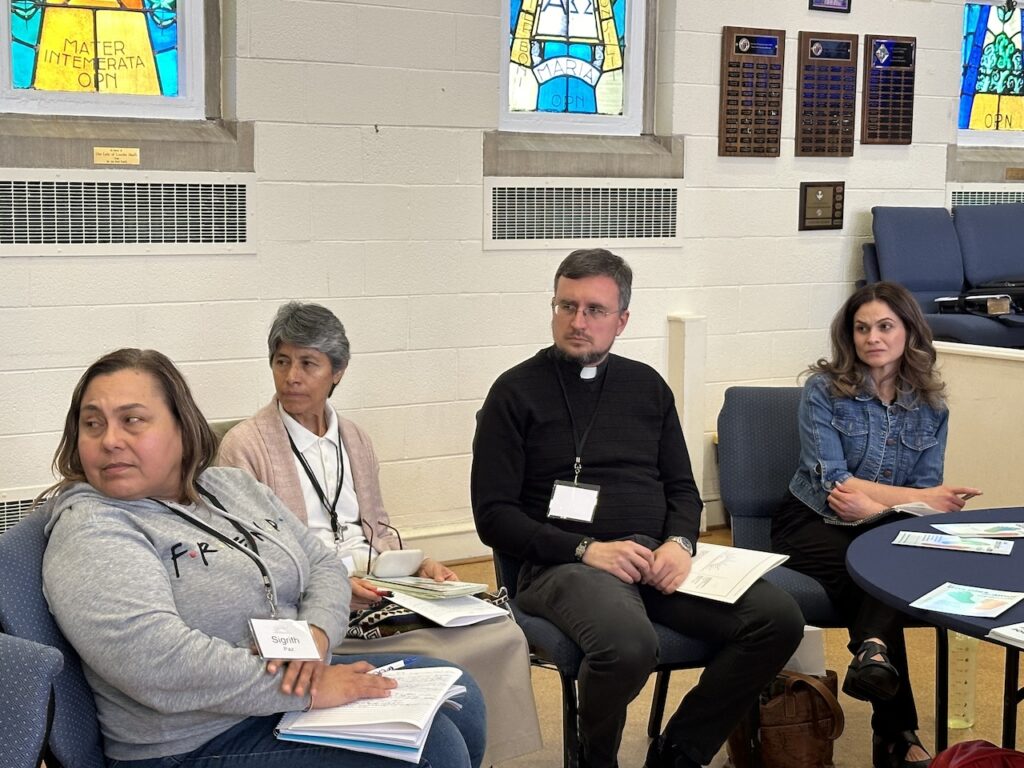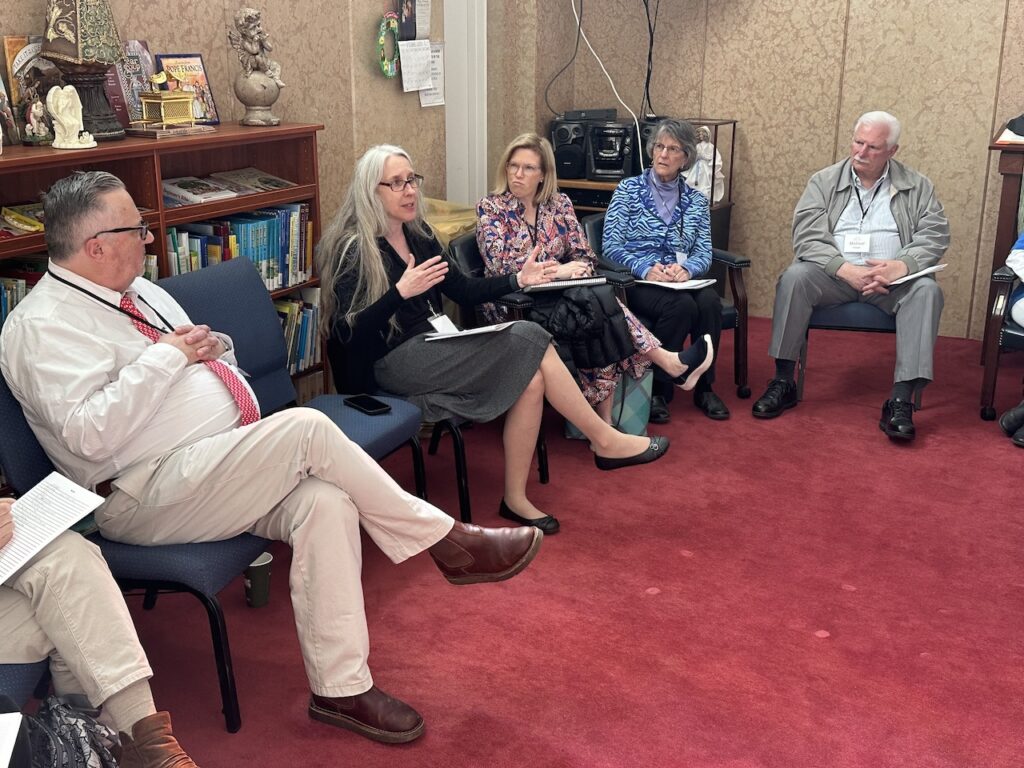In his 2005 encyclical “Deus caritas est,” Pope Benedict XVI wrote, “For the Church, charity … is a part of her nature, an indispensable expression of her very being.”
At the SHINE Conference March 1, Ingrid Delgado, associate director for the United States Conference of Catholic Bishops’ (USCCB) Office of Government Relations, quoted the encyclical in her keynote speech. Delgado added, “The Catholic Church is the largest social provider outside of the government because we take the Gospel seriously. Charity is essential, not an option.”
Organized by the diocesan Office of Social Ministries (OSM), the annual SHINE Conference is an opportunity for those interested in the charitable mission of the Church – from food pantries to prison ministry to refugee resettlement – to learn more about getting involved and to share ideas. For the first time, the SHINE Conference offered breakout talks in Spanish, the fruit of a collaboration with the diocesan Office of Ethnic Ministries (OEM).
“There’s a lot of overlap with OSM and OEM,” said Tina Wandersee, OSM director. “We wanted to offer those bilingual sessions to get our Spanish-speaking brothers and sisters involved with outreach ministries. A lot of parishes have Spanish speakers coming to them in need right now.”
This year, the conference took place at Our Lady of Lourdes, Richmond. The day began with Mass in the morning, celebrated by Bishop Barry C. Knestout and concelebrated by pastor Father Jonathan Goertz.
In his homily, Bishop Knestout reminded attendees of “our responsibility to respond to the rights of other human beings,” paraphrasing Zechariah 7:10: “Be attentive to the widow, the orphan, and the resident alien.”
Learning to advocate
The theme of the conference this year, said Wandersee, was advocacy.
“People at the lowest levels in our parishes know the stories of the poor and vulnerable, they know some of the reasons why they’re suffering [from] poverty,” she said. “This year was really about empowering them to advocate on behalf of those stories that they’ve heard.”
Emily Jackson, social and digital media outreach specialist for the Virginia Catholic Conference (VCC), was in attendance. VCC was founded by Virginia’s Catholic bishops in 2004 and advocates at the Virginia General Assembly for public policy that reflects natural law and advances human dignity.
Jackson suggested that lobbying for one’s beliefs can happen beyond the confines of the State Capitol. “You can track your representatives down all year round,” Jackson said. “They have local offices near where you live. If they see someone outside of the General Assembly legislative session, they will notice you.”
Dan Kearns, executive director of the Society of St. Vincent de Paul Richmond Council, noted that policies advocated by the Catholic Church fall on both sides of the American political spectrum.
“The right wing has some really valid points, and people that are completely on the other side have some really valid points,” said Kearns. “How do we get to that middle ground, where we have common sense and treat people decently?”
In her role with the Office of Government Relations, said Delgado, “I have an ability to go and talk to every member of Congress, every member of the state legislature, and agree with them on something and challenge them on something else.”
In her afternoon breakout session, Wandersee offered ways for those interested in political advocacy to get involved.
“If you haven’t done it before and you want to listen in, all you have to do is reach out to OSM, and I can put you in touch with a group who happens to be meeting with a legislator’s office,” said Wandersee.
“You don’t even have to say anything; you can just sit there and watch,” added Wandersee. “Some people in our network don’t meet regularly, but they’ll jump on a Zoom call when there’s a meeting with a legislator, just for numbers. Now, [the legislators] are seeing more faces, more people who have come together to speak out for those who are poor and vulnerable.”
Ministering locally
In the downstairs social hall, Deacon Frank Nelson, who serves at Holy Rosary, Richmond, spoke about prison ministry. He was followed by Ray Higgins, lead organizer for Roanoke Justice Ministries, who spoke about community organization.
Another frequent topic of conversation throughout the conference was the issue of migration and refugee resettlement. Daniel Villar, OEM director, gave two breakout talks on the theology of migration.
“Due to the change in [presidential] administration, [migration] is something that’s been on people’s minds,” said Wandersee.
In his talk, Villar emphasized, “Migrant, immigrant, and refugee are not synonyms.”
Delgado had an intimate conversation with many of the Spanish speakers in attendance. Father Goertz, who speaks fluent Spanish, listened in.

“The conversation I had with the Spanish-speaking community – they’re in pain, they’re in fear,” said Delgado. “This isn’t … hyperbole. They are afraid of going to hospitals, to churches. How do we share that experience with pastors, so they know that people are suffering?”
Commonwealth Catholic Charities CEO Jay Brown delivered the closing remarks. His talk came the day after the Feb. 28 cancellation of the USCCB’s refugee resettlement contract with the federal government.
“All across Virginia, our lives are extraordinarily improved because of the refugee resettlement program,” said Brown.
“We’ve been doing this work since the fall of Saigon,” he added. “This is part of who we are as a family in the Catholic Diocese of Richmond, and we are desperate to be able to continue to provide these services.”
Mary Ellen Bebermeyer, parishioner of Good Shepherd, Smithfield, said, “When you talk about being most effective, I think we all hear what’s going on nationally, because that’s what’s on the news. But I think where we need to focus our efforts is on the local level, because that’s where we can have the most impact.”
“Yes, it’s one person at a time, but that can snowball quickly,” she said.

